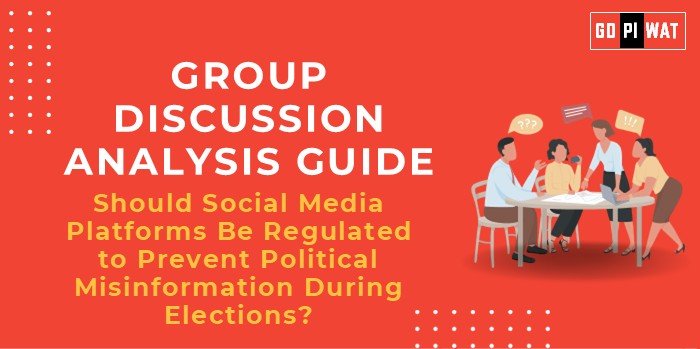📋 Group Discussion Analysis Guide: Should Social Media Platforms Be Regulated to Prevent Political Misinformation During Elections?
🌟 Introduction to the Topic
Opening Context: Social media has revolutionized political engagement globally, offering unprecedented opportunities for information dissemination and citizen participation. However, the same platforms have become conduits for political misinformation, influencing elections and undermining democratic institutions.
Topic Background: The debate over regulating social media during elections gained prominence following incidents of foreign interference and misinformation campaigns in major democratic processes, including the 2016 US Presidential election and India’s 2019 General Elections. Policymakers and tech companies face a balancing act between free speech and preventing electoral manipulation.
📊 Quick Facts and Key Statistics
- Global Social Media Users: 4.8 billion (2023) – Key influence on political communication globally.
- Misinformation Prevalence: Over 60% of users report encountering fake political news online (Pew Research, 2023).
- Election Interference Costs: Estimated global economic cost of election manipulation: $9 billion annually.
- Fact-Checking Initiatives: Facebook and Twitter combined removed over 15 million fake accounts in 2022 during election periods.
👥 Stakeholders and Their Roles
- Governments: Enact regulations and promote digital literacy.
- Social Media Companies: Implement algorithms to identify and remove misinformation.
- Citizens: Critical in reporting and combating fake news.
- Civil Societies: Advocacy for transparency and accountability.
✅ Achievements and Challenges
🏆 Achievements:
- Introduction of fact-checking partnerships by platforms like Meta and Google.
- Legislative action: EU’s Digital Services Act mandates social media accountability.
- Citizen-driven fact-checking initiatives gaining traction globally.
⚠️ Challenges:
- Enforcement of regulations without infringing free speech rights.
- Lack of uniform global standards for misinformation.
- Insufficient investment in misinformation detection technologies.
🌍 Global Comparisons:
- Success: Estonia’s e-Governance safeguards minimize misinformation risks.
- Challenges: Myanmar’s 2017 misinformation crisis showcases regulatory gaps.
📌 Structured Arguments for Discussion
- Supporting Stance: “Social media regulation is crucial to maintaining electoral integrity and preventing manipulation.”
- Opposing Stance: “Regulations risk stifling free speech and enabling government overreach.”
- Balanced Perspective: “Targeted regulations, complemented by transparency measures, can mitigate risks without suppressing freedoms.”
🔍 Effective Discussion Approaches
- Opening Approaches:
- “Social media influences 70% of voting-age citizens—shouldn’t it be regulated to protect electoral integrity?”
- “The global impact of fake news has made fact-checking essential, particularly during elections.”
- Counter-Argument Handling:
- Example: Free speech concern: “While free speech is vital, misinformation threatens democratic foundations. Balance is key.”
📈 Strategic Analysis: SWOT
- Strengths: Wide-reaching platform for voter engagement.
- Weaknesses: Vulnerability to fake news proliferation.
- Opportunities: Adoption of AI for proactive content moderation.
- Threats: Politicization of regulations leading to biased enforcement.
🎓 Connecting with B-School Applications
- Real-World Applications: Frameworks for ethical governance, policy-making, and digital transformation projects.
- Sample Interview Questions:
- “Should social media companies be self-regulating or government-regulated during elections?”
- “What role does data privacy play in political misinformation?”
- Insights for B-School Students:
- Explore intersections between governance, ethics, and technology.


